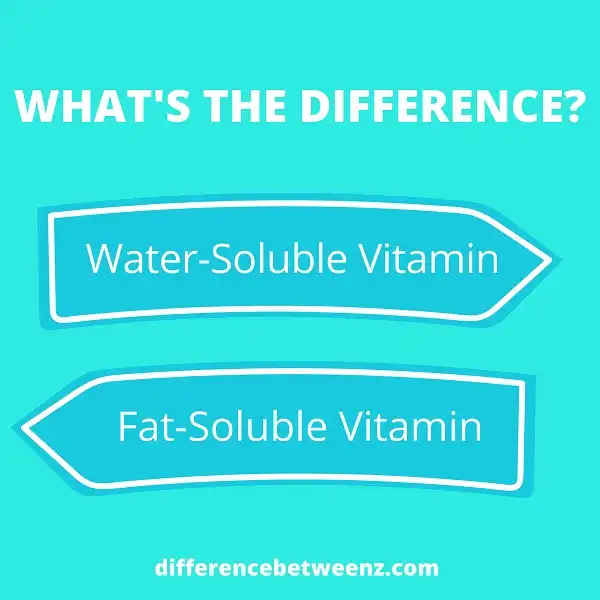We all know that vitamins are important for our health, but did you know there are two types of vitamins: water-soluble and fat-soluble? Each type has its own unique benefits. In this blog post, we’ll explore the differences between water and fat-soluble vitamins. Stay tuned to learn more!
What is Water-Soluble Vitamin?
Vitamins are essential nutrients required by the body in small quantities to remain healthy. While most vitamins can be obtained from the diet, some are also available in supplement form. Water-soluble vitamins are a type of vitamin that dissolves in water and is excreted in the urine. Unlike fat-soluble vitamins, which are stored in the body, water-soluble vitamins must be replenished on a daily basis.
The eight water-soluble vitamins are Vitamin C (ascorbic acid) and the B-complex vitamins: thiamin (vitamin B1), riboflavin (vitamin B2), niacin (vitamin B3), pantothenic acid (vitamin B5), pyridoxine (vitamin B6), biotin (vitamin B7), folic acid (vitamin B9) and cobalamin (vitamin B12). These vitamins play important roles in metabolism, energy production, nerve function, and red blood cell formation. Because they are not stored in the body, it is important to consume foods rich in these nutrients or take supplements on a daily basis to ensure adequate intake.
What is Fat-Soluble Vitamin?
Fat-soluble vitamins are vitamins that are stored in the body’s fat tissue. Fat-soluble vitamins are not water-soluble and can build up in the body. The four fat-soluble vitamins are A, D, E, and K. Vitamin A is good for vision, skin, and immunity. Vitamin D is good for bones and teeth. Vitamin E is antioxidant and good for the skin. Vitamin K is good for blood clotting. Fat-soluble vitamins are absorbed with fat from food in the intestine. Fat-soluble vitamins are not excreted as easily as water-soluble vitamins and can be toxic at high doses. The Recommended Dietary Allowance (RDA) for each vitamin depends on age, sex, and other factors. Supplements should be taken with caution because too much of a fat-soluble vitamin can be harmful.
Difference between Water and Fat-Soluble Vitamin
- Water and fat-soluble vitamins are both essential nutrients that the body needs in order to function properly. However, there are some key differences between these two types of vitamins. Water-soluble vitamins are not stored in the body and need to be replenished on a daily basis. Fat-soluble vitamins, on the other hand, are stored in the liver and can last for several months before they need to be replaced. Because of this, fat-soluble vitamins can build up in the body and potentially cause toxicity if taken in large amounts.
- Another key difference is that water-soluble vitamins are absorbed directly into the bloodstream, while fat-soluble vitamins are first broken down by the digestive system before being absorbed. This means that fat-soluble vitamins may not be as easily available to the body as water-soluble vitamins.
- Despite these differences, both water and fat-soluble vitamins are essential for good health. They both play important roles in maintaining metabolism, supporting immune function, and promoting growth and development. So make sure to include both types of vitamins in your diet to ensure optimal health!
Conclusion
Though water and fat-soluble vitamins are both essential for human health, they have different properties that make them important in different ways. Water-soluble vitamins dissolve in water and are generally flushed out of the body when they are not needed, while fat-soluble vitamins attach to fatty acids and are stored in the liver and other organs. This difference means that water-soluble vitamins need to be consumed more regularly than fat-soluble vitamins to ensure a steady stream of nutrients into the body. Fat-soluble vitamins can also build up over time if too many are consumed at once, leading to toxic levels.


